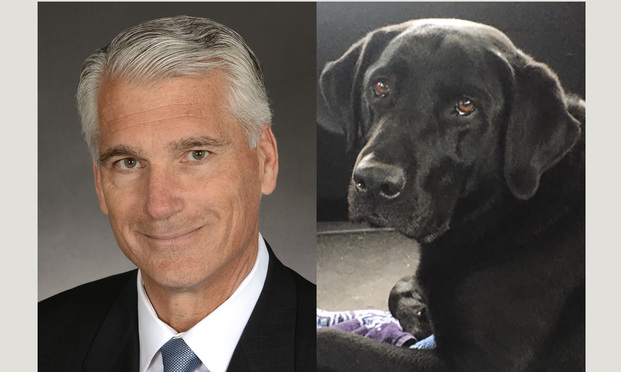How In-House Counsel Can Impact Mediations (and Visit With Dogs)
Companies are investing in more in-house counsel with litigation savvy to help shape their resolution strategy and partner with outside counsel. Today, those companies see the return on their investment in more efficient resolutions.
May 01, 2020 at 04:58 PM
7 minute read
 Attorney Mark LeHocky and his dog Gunnar/courtesy photos
Attorney Mark LeHocky and his dog Gunnar/courtesy photos
In-house counsel can play a vital part in mediation because they know the inside workings of their business, according to Mark LeHocky, a former general counsel and now a mediator, arbitrator and special master based in San Francisco.
LeHocky recently talked with Corporate Counsel about the role of in-house counsel in mediation, along with how COVID-19 has impacted his work.
His background includes becoming a full-time mediator in 2012 after serving five years as general counsel for retail giant Ross Stores Inc. For seven years before that, he was general counsel for Dreyer's Grand Ice Cream Inc., navigating through its merger with Nestle S.A.
Before going in-house, LeHocky honed his litigation skills at two San Francisco law firms: Wilson, Ryan & Campilongo and Khourie, Crew & Jaeger, formerly Broad, Khourie & Schulze. He then became a principal in the boutique law firm of Freeland, Cooper, LeHocky & Hamburg, managing its complex litigation.
Below are excerpts from his conversation with Corporate Counsel, edited for brevity and clarity.
Corporate Counsel: In-house counsel have not always been active in alternative dispute resolution. When did that change and why?
Mark LeHocky: The change is most notable in recent years. Shortly before entering the general counsel ranks two decades ago, I also began mediating for the federal court in San Francisco. Then, I noticed that many in-house counsel were fairly passive in mediation sessions, let alone in pre-calls with, or the selection of, neutrals.
That has shifted more recently, and all for the good. Companies are investing in more in-house counsel with litigation savvy to help shape their resolution strategy and partner with outside counsel. Today, those companies see the return on their investment in more efficient resolutions.
CC: Who most often represents a company in these proceedings, the general counsel? Chief litigation counsel? Someone else?
ML: The higher the risk—financial as well as reputational—the more likely general counsel or senior litigation counsel are to attend.
CC: What is the key role of an in-house counsel in mediation?
ML: In many ways in-house counsel operate as both translators and mediators with their internal stakeholders. While outside counsel are legal subject matter experts, in-house counsel are experts in the client.
Companies vary wildly in culture, risk tolerance and decision-making. In-house counsel better understand their unique business, organizational dynamics, culture and what works—and what doesn't—in obtaining alignment around dispute resolution.
CC: Can you give an example of a recent mediation in which an in-house counsel played an important part?
ML: Sure. In a recent remote mediation involving a very large company, I didn't count on the general counsel attending. GCs are often overextended, as I well remember.
However, given the ease to attend via [videoconferencing on] Zoom—no plane flights, travel or stay overs needed—the general counsel participated throughout. The teamwork among the GC, senior in-house and outside counsel was terrific, with the general counsel leading the discussion of the trade-offs and direct and indirect costs of various alternatives.
Despite the huge differences at the start, the case resolved in a single session due in major part to the general counsel's active role.
CC: Did you use mediation much during the 12 years you were a general counsel, or the 20 years you were litigating for and against companies in private practice?
ML: Yes and yes. As a litigator, I mediated extensively, resolving disputes large and small, faster and more efficiently. Then, as a GC, I attended mediations when it might help communications with the other side.
That effort routinely paid off—better explaining our position, better understanding theirs, and helping everyone recalibrate when recalibration was needed.
We also tracked those outcomes, counting everything that mattered [including] outside and inside costs, people time, settlements, penalties and such. The net savings exceeded our expectations, prompting us to mediate early and regularly to diagnose and resolve most disputes.
CC: When and why did you start using remote mediation, just during the COVID-19 pandemic or before?
ML: I've been mediating remotely for many years, via Skype and other devices, working with people and companies in different time zones and countries. COVID-19 has been a game changer for all of us, but fortunately newer tools like Zoom improve remote mediations markedly.
CC: Describe how it works.
ML: Zoom allows mediators to set up separate virtual meeting rooms. As with an in-person session, each side has their own room or rooms, as well as separate breakout rooms for counsel, any carriers and, of course, joint sessions. The mediator then switches back and forth and can also move participants about—just like an in-person session.
CC: What are some pros and cons of trying to resolve disputes remotely?
ML: Tools like Zoom are easy to use. More importantly, they eliminate travel time and costs, which helps senior and junior folks make sense of attending. Good things typically come from that.
The biggest trade-off is the lack of in-person conversation and some nonverbal ways we all communicate. But there are workarounds, including pre-calls or conferences with in-house and outside counsel.
This pre-work helps build credibility and understanding as to objectives, interests and organizational dynamics as well as legal positions. Here again, in-house counsel can play a key role in shaping a productive path.
CC: Zoom hackers have been in the news lately. Have you had any problem with uninvited guests in your sessions?
ML: I've not heard of a Zoom hack in remote mediations. We follow a strict password protocol, and I can always monitor who's on the videoconference. The Zoom hack stories I've read appear to involve poor password protection, bored teenagers and hate groups—fortunately not my world.
Keep in mind that mediations are governed by state and federal confidentiality laws. Anyone disclosing or misusing conversations from a mediation, via Zoom or in person, is subject to severe sanctions.
CC: Have you had any glitches or humorous moments using remote videoconferencing?
ML: The glitches are generally small and readily fixable, such as people forgetting to unmute themselves or accidentally disconnecting. As standard practice, I provide my phone number, and we solve everything quickly via calls and texts.
On the humor side, my 92-pound black Labrador retriever, Gunnar, wandered into view during a recent Zoom mediation, prompting many comments and descriptions of others' pets. I assured everyone he had signed the confidentiality agreement.
It turned out to be a great respite from the tough conversations we were working through, and he received some credit for the settlement we reached.
Later, when I shared the story with my family, one daughter offered a note of caution. "Dad," she asked, "are you worried that next time they'll ask how much just to hire Gunnar?"
I wasn't. Now I am, a little.
This content has been archived. It is available through our partners, LexisNexis® and Bloomberg Law.
To view this content, please continue to their sites.
Not a Lexis Subscriber?
Subscribe Now
Not a Bloomberg Law Subscriber?
Subscribe Now
NOT FOR REPRINT
© 2025 ALM Global, LLC, All Rights Reserved. Request academic re-use from www.copyright.com. All other uses, submit a request to [email protected]. For more information visit Asset & Logo Licensing.
You Might Like
View All
Wells Fargo and Bank of America Agree to Pay Combined $60 Million to Settle SEC Probe

Amex Latest Target as Regulators Scrutinize Whether Credit Card Issuers Deliver on Rewards Promises

MLB's Texas Rangers Search for a New GC and a Broadcasting Deal

Survey Finds Majority of Legal Professionals Still Intimidated by AI Despite Need to Streamline Mounting Caseloads
Trending Stories
- 1Relaxing Penalties on Discovery Noncompliance Allows Criminal Cases to Get Decided on Merit
- 2Reviewing Judge Merchan's Unconditional Discharge
- 3With New Civil Jury Selection Rule, Litigants Should Carefully Weigh Waiver Risks
- 4Young Lawyers Become Old(er) Lawyers
- 5Caught In the In Between: A Legal Roadmap for the Sandwich Generation
Who Got The Work
J. Brugh Lower of Gibbons has entered an appearance for industrial equipment supplier Devco Corporation in a pending trademark infringement lawsuit. The suit, accusing the defendant of selling knock-off Graco products, was filed Dec. 18 in New Jersey District Court by Rivkin Radler on behalf of Graco Inc. and Graco Minnesota. The case, assigned to U.S. District Judge Zahid N. Quraishi, is 3:24-cv-11294, Graco Inc. et al v. Devco Corporation.
Who Got The Work
Rebecca Maller-Stein and Kent A. Yalowitz of Arnold & Porter Kaye Scholer have entered their appearances for Hanaco Venture Capital and its executives, Lior Prosor and David Frankel, in a pending securities lawsuit. The action, filed on Dec. 24 in New York Southern District Court by Zell, Aron & Co. on behalf of Goldeneye Advisors, accuses the defendants of negligently and fraudulently managing the plaintiff's $1 million investment. The case, assigned to U.S. District Judge Vernon S. Broderick, is 1:24-cv-09918, Goldeneye Advisors, LLC v. Hanaco Venture Capital, Ltd. et al.
Who Got The Work
Attorneys from A&O Shearman has stepped in as defense counsel for Toronto-Dominion Bank and other defendants in a pending securities class action. The suit, filed Dec. 11 in New York Southern District Court by Bleichmar Fonti & Auld, accuses the defendants of concealing the bank's 'pervasive' deficiencies in regards to its compliance with the Bank Secrecy Act and the quality of its anti-money laundering controls. The case, assigned to U.S. District Judge Arun Subramanian, is 1:24-cv-09445, Gonzalez v. The Toronto-Dominion Bank et al.
Who Got The Work
Crown Castle International, a Pennsylvania company providing shared communications infrastructure, has turned to Luke D. Wolf of Gordon Rees Scully Mansukhani to fend off a pending breach-of-contract lawsuit. The court action, filed Nov. 25 in Michigan Eastern District Court by Hooper Hathaway PC on behalf of The Town Residences LLC, accuses Crown Castle of failing to transfer approximately $30,000 in utility payments from T-Mobile in breach of a roof-top lease and assignment agreement. The case, assigned to U.S. District Judge Susan K. Declercq, is 2:24-cv-13131, The Town Residences LLC v. T-Mobile US, Inc. et al.
Who Got The Work
Wilfred P. Coronato and Daniel M. Schwartz of McCarter & English have stepped in as defense counsel to Electrolux Home Products Inc. in a pending product liability lawsuit. The court action, filed Nov. 26 in New York Eastern District Court by Poulos Lopiccolo PC and Nagel Rice LLP on behalf of David Stern, alleges that the defendant's refrigerators’ drawers and shelving repeatedly break and fall apart within months after purchase. The case, assigned to U.S. District Judge Joan M. Azrack, is 2:24-cv-08204, Stern v. Electrolux Home Products, Inc.
Featured Firms
Law Offices of Gary Martin Hays & Associates, P.C.
(470) 294-1674
Law Offices of Mark E. Salomone
(857) 444-6468
Smith & Hassler
(713) 739-1250






